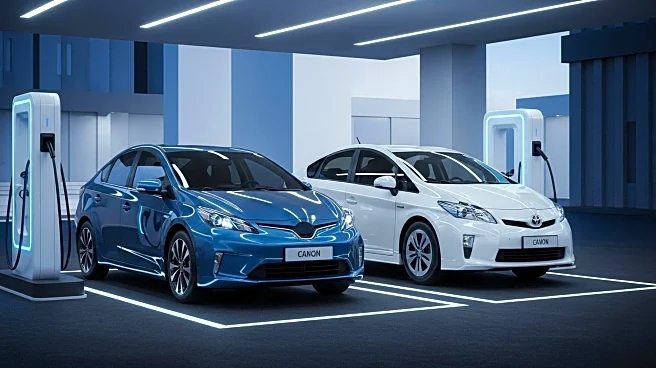What's Happening?
Canon UK has completed a significant overhaul of its fleet, transitioning to electric and hybrid vehicles. This initiative is part of Canon's broader sustainability goals, aiming to decarbonize its engineering and service operations. The transition, which began in June and concluded in September, involves 72% of the fleet being electric vehicles, while the remaining 28% are hybrids. This change is expected to reduce Canon's Scope 1 operational emissions by approximately 50%. To support this transition, Canon has provided free home EV chargers for engineers who choose electric vehicles and implemented enhanced mileage tracking for those opting for hybrids. This move aligns with Canon's commitment to achieving net zero emissions by 2050 and reflects its corporate philosophy of living and working together for the common good.
Why It's Important?
The transition to electric and hybrid vehicles by Canon UK is a significant step towards reducing carbon emissions in the corporate sector. By cutting its fleet emissions by 50%, Canon sets a precedent for other companies aiming to meet sustainability targets. This move not only supports environmental goals but also enhances Canon's reputation as a responsible corporate citizen. The initiative could influence procurement decisions in both public and private sectors, where environmental impact is increasingly a factor. Additionally, the shift to a more sustainable fleet may encourage other companies to adopt similar practices, potentially leading to broader industry changes in fleet management and sustainability efforts.
What's Next?
Canon's transition to a sustainable fleet is likely to prompt further developments in its service operations. The company may continue to innovate in smart serviceability and self-service portals to enhance customer support while minimizing environmental impact. As the demand for sustainable practices grows, Canon's approach could serve as a model for other organizations. The success of this initiative may lead to further investments in sustainability, potentially expanding to other areas of Canon's operations. Stakeholders, including customers and environmental groups, will likely monitor Canon's progress towards its net zero emissions goal, influencing future corporate strategies.
Beyond the Headlines
Canon's fleet transition highlights the growing importance of corporate responsibility in addressing climate change. The move underscores the ethical dimension of business operations, where companies are increasingly expected to contribute to environmental sustainability. This shift may also reflect a cultural change within the corporate world, where sustainability is becoming integral to business models. As more companies adopt similar practices, there could be a long-term shift towards greener technologies and operations, influencing industry standards and consumer expectations.










